2021年深圳沪教版版中考英语专题主从复合句写作(三)讲义 (含答案)
文档属性
| 名称 | 2021年深圳沪教版版中考英语专题主从复合句写作(三)讲义 (含答案) |
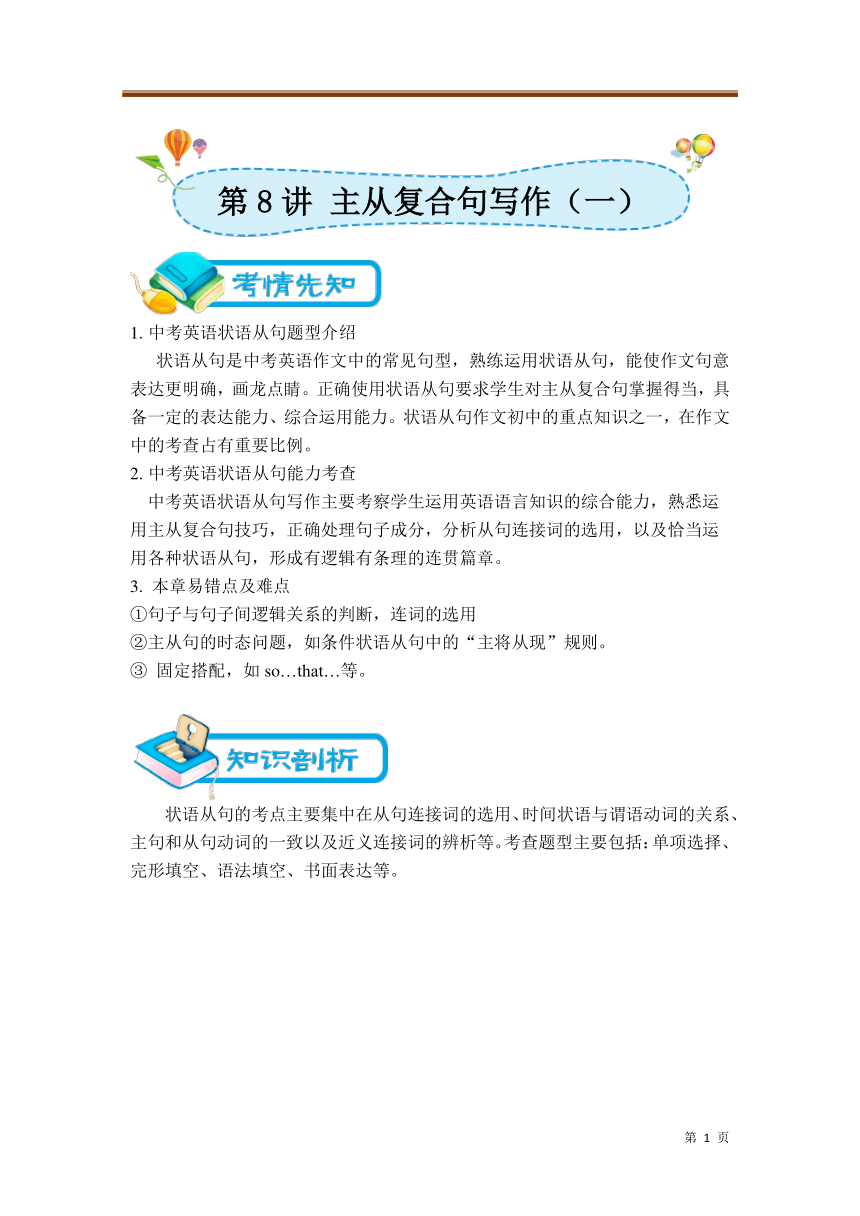
|
|
| 格式 | zip | ||
| 文件大小 | 273.6KB | ||
| 资源类型 | 教案 | ||
| 版本资源 | 牛津深圳版 | ||
| 科目 | 英语 | ||
| 更新时间 | 2021-05-16 00:00:00 | ||
图片预览

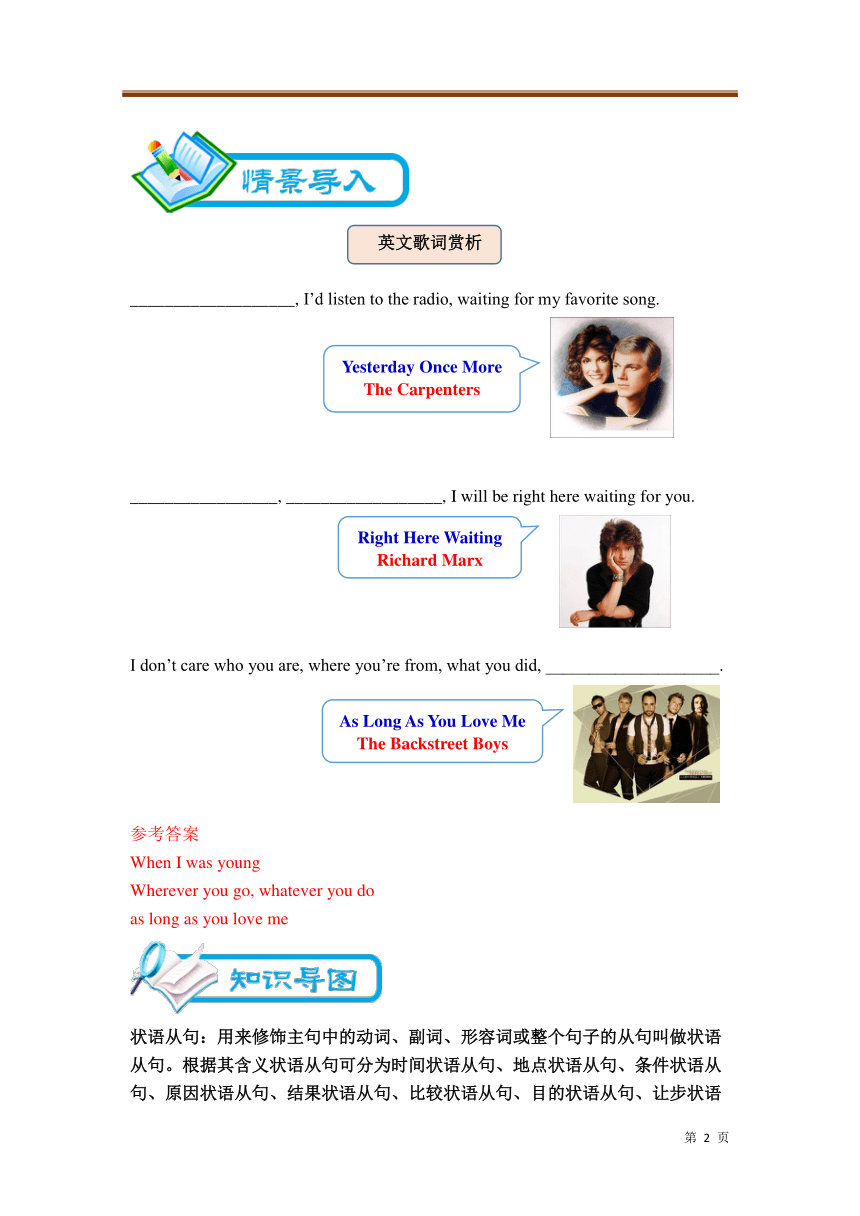
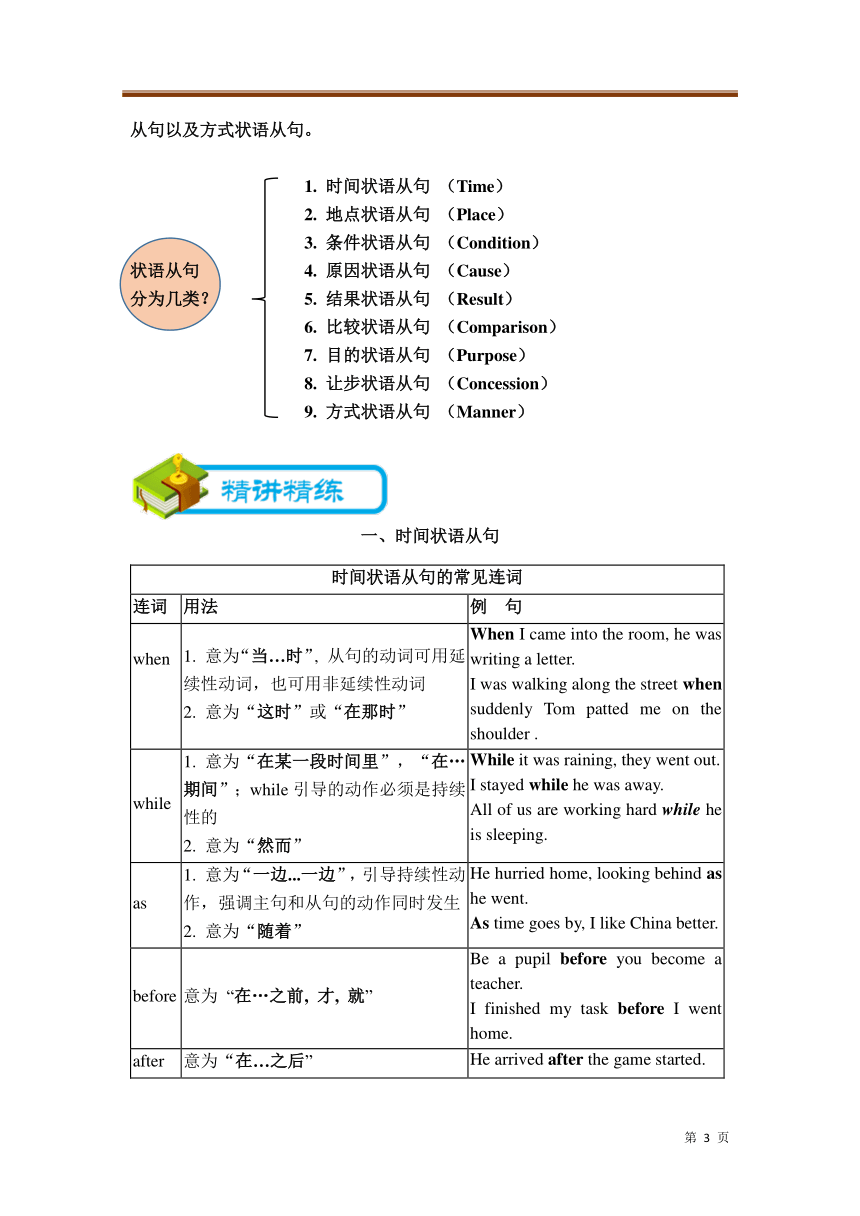
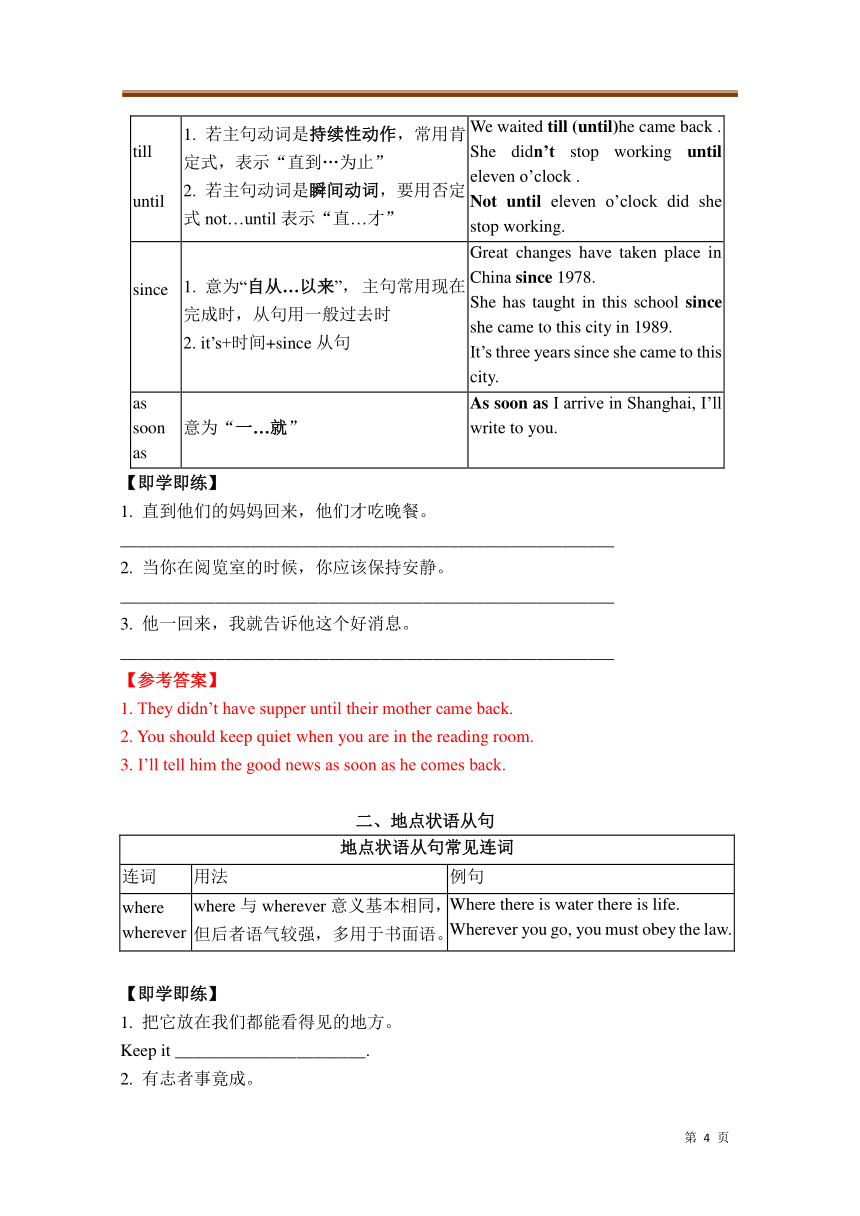
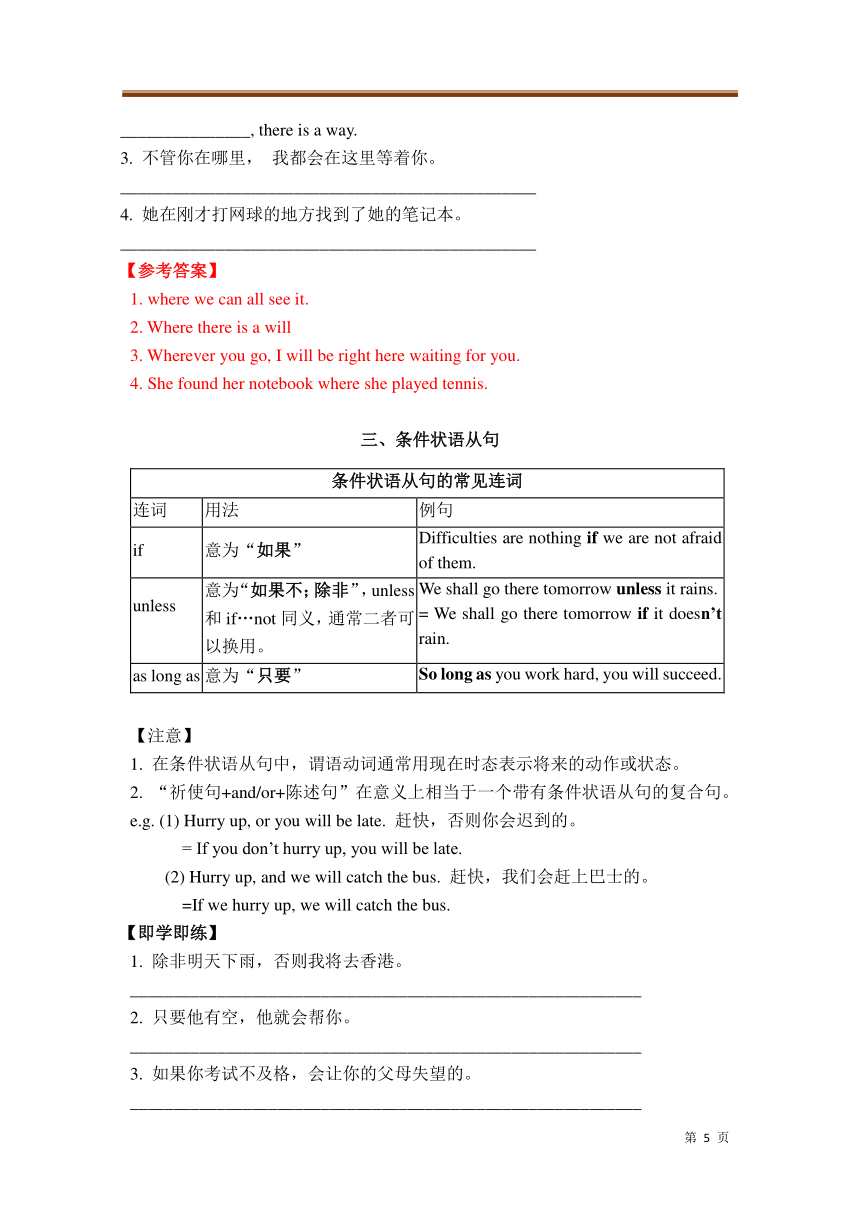
文档简介
中考英语状语从句题型介绍
状语从句是中考英语作文中的常见句型,熟练运用状语从句,能使作文句意表达更明确,画龙点睛。正确使用状语从句要求学生对主从复合句掌握得当,具备一定的表达能力、综合运用能力。状语从句作文初中的重点知识之一,在作文中的考查占有重要比例。
中考英语状语从句能力考查
中考英语状语从句写作主要考察学生运用英语语言知识的综合能力,熟悉运用主从复合句技巧,正确处理句子成分,分析从句连接词的选用,以及恰当运用各种状语从句,形成有逻辑有条理的连贯篇章。
3.
本章易错点及难点
①句子与句子间逻辑关系的判断,连词的选用
②主从句的时态问题,如条件状语从句中的“主将从现”规则。
③
固定搭配,如so…that…等。
状语从句的考点主要集中在从句连接词的选用、时间状语与谓语动词的关系、主句和从句动词的一致以及近义连接词的辨析等。考查题型主要包括:单项选择、完形填空、语法填空、书面表达等。
英文歌词赏析
___________________,
I’d
listen
to
the
radio,
waiting
for
my
favorite
song.
_________________,
__________________,
I
will
be
right
here
waiting
for
you.
I
don’t
care
who
you
are,
where
you’re
from,
what
you
did,
____________________.
参考答案
When
I
was
young
Wherever
you
go,
whatever
you
do
as
long
as
you
love
me
状语从句:用来修饰主句中的动词、副词、形容词或整个句子的从句叫做状语从句。根据其含义状语从句可分为时间状语从句、地点状语从句、条件状语从句、原因状语从句、结果状语从句、比较状语从句、目的状语从句、让步状语从句以及方式状语从句。
1.
时间状语从句
(Time)
2.
地点状语从句
(Place)
3.
条件状语从句
(Condition)
状语从句
4.
原因状语从句
(Cause)
分为几类?
5.
结果状语从句
(Result)
6.
比较状语从句
(Comparison)
7.
目的状语从句
(Purpose)
8.
让步状语从句
(Concession)
9.
方式状语从句
(Manner)
一、时间状语从句
时间状语从句的常见连词
连词
用法
例
句
when
1.
意为“当…时”,
从句的动词可用延续性动词,也可用非延续性动词
2.
意为“这时”或“在那时”
When
I
came
into
the
room,
he
was
writing
a
letter.
I
was
walking
along
the
street
when
suddenly
Tom
patted
me
on
the
shoulder
.
while
1.
意为“在某一段时间里”,“在…期间”;while引导的动作必须是持续性的
2.
意为“然而”
While
it
was
raining,
they
went
out.
I
stayed
while
he
was
away.
All
of
us
are
working
hard
while
he
is
sleeping.
as
1.
意为“一边...一边”,引导持续性动作,强调主句和从句的动作同时发生
2.
意为“随着”
He
hurried
home,
looking
behind
as
he
went.
As
time
goes
by,
I
like
China
better.
before
意为
“在…之前,
才,
就”
Be
a
pupil
before
you
become
a
teacher.
I
finished
my
task
before
I
went
home.
after
意为“在…之后”
He
arrived
after
the
game
started.
till
until
1.
若主句动词是持续性动作,常用肯定式,表示“直到…为止”
2.
若主句动词是瞬间动词,要用否定式not…until表示“直…才”
We
waited
till
(until)he
came
back
.
She
didn’t
stop
working
until
eleven
o’clock
.
Not
until
eleven
o’clock
did
she
stop
working.
since
1.
意为“自从…以来”,
主句常用现在完成时,从句用一般过去时
2.
it’s+时间+since从句
Great
changes
have
taken
place
in
China
since
1978.
She
has
taught
in
this
school
since
she
came
to
this
city
in
1989.
It’s
three
years
since
she
came
to
this
city.
as
soon
as
意为“一…就”
As
soon
as
I
arrive
in
Shanghai,
I’ll
write
to
you.
【即学即练】
1.
直到他们的妈妈回来,他们才吃晚餐。
_________________________________________________________
2.
当你在阅览室的时候,你应该保持安静。
_________________________________________________________
3.
他一回来,我就告诉他这个好消息。
_________________________________________________________
【参考答案】
1.
They
didn’t
have
supper
until
their
mother
came
back.
2.
You
should
keep
quiet
when
you
are
in
the
reading
room.
3.
I’ll
tell
him
the
good
news
as
soon
as
he
comes
back.
二、地点状语从句
地点状语从句常见连词
连词
用法
例句
where
wherever
where与wherever意义基本相同,但后者语气较强,多用于书面语。
Where
there
is
water
there
is
life.
Wherever
you
go,
you
must
obey
the
law.
【即学即练】
1.
把它放在我们都能看得见的地方。
Keep
it
______________________.
2.
有志者事竟成。
_______________,
there
is
a
way.
3.
不管你在哪里,
我都会在这里等着你。
________________________________________________
4.
她在刚才打网球的地方找到了她的笔记本。
________________________________________________
【参考答案】
1.
where
we
can
all
see
it.
2.
Where
there
is
a
will
3.
Wherever
you
go,
I
will
be
right
here
waiting
for
you.
4.
She
found
her
notebook
where
she
played
tennis.
条件状语从句的常见连词
连词
用法
例句
if
意为“如果”
Difficulties
are
nothing
if
we
are
not
afraid
of
them.
unless
意为“如果不;除非”,unless和if…not同义,通常二者可以换用。
We
shall
go
there
tomorrow
unless
it
rains.
=
We
shall
go
there
tomorrow
if
it
doesn’t
rain.
as
long
as
意为“只要”
So
long
as
you
work
hard,
you
will
succeed.
三、条件状语从句
【注意】
1.
在条件状语从句中,谓语动词通常用现在时态表示将来的动作或状态。
2.
“祈使句+and/or+陈述句”在意义上相当于一个带有条件状语从句的复合句。
e.g.
(1)
Hurry
up,
or
you
will
be
late.
赶快,否则你会迟到的。
=
If
you
don’t
hurry
up,
you
will
be
late.
(2)
Hurry
up,
and
we
will
catch
the
bus.
赶快,我们会赶上巴士的。
=If
we
hurry
up,
we
will
catch
the
bus.
【即学即练】
1.
除非明天下雨,否则我将去香港。
___________________________________________________________
2.
只要他有空,他就会帮你。
___________________________________________________________
3.
如果你考试不及格,会让你的父母失望的。
___________________________________________________________
4.
如果明天不下雨,我们就去远足。
___________________________________________________________
5.
只要你让它保持干净,你就可以借我的帽子。
___________________________________________________________
6.
如果他没有完成他的作业,那将会发生什么事?
___________________________________________________________
【参考答案】
1.
Unless
it
rains
tomorrow,
I
will
go
to
Hong
Kong.
2.
He
will
help
you
as
long
as
he
is
free.
3.
If
you
fail
in
the
exam,
you
will
let
your
parents
down.
4.
We
will
go
hiking
tomorrow
unless
it
rains.
5.
You
can
borrow
my
hat
as
long
as
you
keep
it
clean.
6.
What
will
happen
if
he
doesn’t
finish
his
homework?
四、原因状语从句
原因状语从句常见连词
连词
用法
例句
because
because用来回答why
的问题,语气最强一般放在主句之后
I
was
late
yesterday
because
I
was
ill.
since
since表示既然或全已知的理由,稍加分析即可表明的原因,多放句首
Since
everyone
is
here,
let’s
begin
our
meeting.
as
从句常放在句首,说明次要的原因,主句说明结果,常用于口语中
As
he
didn’t
know
much
English,
he
looked
up
the
word
in
the
dictionary
.
【注意】
because,
as,
since不能与so同时使用。
【即学即练】
1.
昨天我上课迟到了,因为我的自行车出问题了。
___________________________________________________________
2.
既然我们住在海边,我们就可以享受美好的天气。
___________________________________________________________
3.
由于他的爷爷生病了,今天早上他没有来。
___________________________________________________________
4.
水是很重要的,因为没有他我们就无法生存。
___________________________________________________________
5.
由于我有事情要告诉她,我叫她待在这里。
___________________________________________________________
【参考答案】
1.
I
was
late
for
class
yesterday
because
there
was
something
wrong
with
my
bike.
2.
Since
we
live
near
the
sea,
we
can
enjoy
nice
weather.
3.
He
didn’t
come
this
morning
as
his
grandfather
was
ill.
4.
Water
is
important
because
we
can’t
live
without
it.
5.
Since
I
had
something
to
tell
her,
I
asked
her
to
stay
here.
五、结果状语从句
结果状语从句常见连词
连词
用法
例句
so
that
意为“因此,所以,结果”,so
that前有逗号
We
turned
up
the
radio,
so
that
everyone
heard
the
news.
so…that
意为“如此…以至于…”,常见结构如下:
so
+
adj./
adv.+
that…
so
+
many/
few
(+可数名词复数)
+
that…
so
+
much/
little(+不可数名词)
+
that…
so
+
adj.
+
a/an+
可数名词单数
He
was
so
glad
that
he
couldn’t
say
a
word.
Mother
lives
so
far
away
that
we
hardly
ever
see
her.
Soon
there
were
so
many
deer
that
they
ate
up
all
the
wild
roses.
He
has
so
little
time
that
he
can’t
go
to
the
cinema
with
you.
It
is
so
interesting
a
novel
that
all
of
us
want
to
read
it.
such…that
意为“如此…以至于…”,常见结构如下:
such
+a/
an
+
adj.
+可数名词单数+
that
such
+adj.
+可数名词复数
+
that
such
+
adj.
+不可数名词
+
that
It
is
such
an
interesting
novel
that
all
of
us
want
to
read
it.
He
gave
such
important
reasons
that
he
was
excused.
He
made
such
rapid
progress
that
he
did
very
well
in
the
mid-term.
such…that与so…that的区别:
名用such,形、副so,多多少少也用so。
【即学即练】
1.
他的父亲太生气了,以至于一句话也说不出来。
___________________________________________________________
2.
它是如此好的一部电影以至于我去看了几次。
___________________________________________________________
3.
天气如此糟糕,以至于我们不得不待在家里。
___________________________________________________________
4.
老师说英语太快了,
我跟不上她。
___________________________________________________________
5.
他犯了太多的错误以至于没有通过考试。
___________________________________________________________
6.
夜已经很深了,
因此我们不得不乘坐出租车。
___________________________________________________________
【参考答案】
1.
His
father
was
so
angry
that
he
couldn’t
say
a
word.
2.
It
was
such
a
good
film
that
I
went
to
see
it
several
times.
3.
It
was
such
bad
weather
that
we
had
to
stay
at
home.
4.
The
teacher
spoke
English
so
fast
that
I
couldn’t
follow
her.
5.
He
made
so
many
mistakes
that
he
didn’t
pass
the
exam.
6.
It
was
really
late
at
night,
so
that
we
had
to
take
a
taxi.
六、比较状语从句
比较状语从句常见连词
连词
用法
例句
as…as
not
so/as…as
as…as意为“和…一样”,
not
so/as…as意为“和…不一样”,在实际运用中,常常省略与主句部分相同的词
The
earth
is
bigger
than
the
moon
(is)
.
He
writes
as
carefully
as
his
sister
(writes/does).
比较级+than
意为“…比…”
He
bought
fewer
books
than
I
(did).
He
runs
less
fast
than
me.
the+比较级,the+比较级
意为“越…,
越…”
The
more
you
read,
the
better
you
understand.
The
harder
you
work,
the
greater
progress
you
will
make.
The
sooner,
the
better.
【即学即练】
1.
这工作没有我想的那么容易。
___________________________________________________________
2.
我的弟弟跟我一样高。
___________________________________________________________
3.
这个游戏比那个游戏有趣得多。
___________________________________________________________
4.
这部电影是三部电影中最有趣的。
___________________________________________________________
5.
这条路是我们城市中最忙碌的街道。
___________________________________________________________
6.
她是我们学校最好的老师之一。
___________________________________________________________
【参考答案】
1.
The
work
isn’t
as
easy
as
I
thought.
2.
My
younger
brother
is
as
tall
as
me.
3.
This
game
is
more
interesting
than
that
one.
4.
The
film
is
the
most
interesting
of
the
three.
5.
This
road
is
the
busiest
street
in
our
city.
6.
She
is
one
of
the
best
teachers
in
our
school.
七、目的状语从句
目的状语从句常见连词
连词
用法
例句
so
that
in
order
that
意为“以便;为了”,目的状语从句中常用情态动词may/
might/
can/
could/
would/
should
等放在动词之前,从句往往放在主句之后,主从句之间不用任何标点符号。
I
shall
write
down
your
telephone
number
so
that
I
may
not
forget.
They
worked
harder
than
usual
in
order
that
they
could
finish
the
work
ahead
of
time.
【注意】
如果目的状语从句的主语与主句的主语相同,可用in
order
to
转化为简单句。
I’ll
write
down
your
phone
number
so
that
I
may
not
forget.
=
I’ll
write
down
your
phone
number
in
order
not
to
forget.
【即学即练】
1.
完成这个,这样你就可以开始另一个。
___________________________________________________________
2.
他会跑得很慢,以便你能赶上他。
___________________________________________________________
3.
她打开窗户是为了让新鲜的空气进来。
___________________________________________________________
4.
你必须快点,这样才不会迟到。
___________________________________________________________
5.
明天早点起床以便你能赶上早班车。
___________________________________________________________
【参考答案】
1.
Finish
this
so
that
you
can
start
another.
2.
He’ll
run
slowly
in
order
that
you
can
catch
up
with
him.
3.
She
opened
the
window
so
that
fresh
air
might
come
in.
4.
You
must
hurry
up,
so
that
you
won’t
be
late.
5.
Get
up
early
tomorrow
in
order
that
you
can
catch
the
early
bus.
八、让步状语从句
让步状语从句常见连词
连词
用法
例句
though
although
意为“虽然”,不能再用but,但可以与yet或still连用。though
/
although意义相同,前者通俗、口语化,后者正式多放主句的前面。
Although
/Though
he
was
over
sixty,
(yet)
he
began
to
learn
French.
We
were
not
tired
though
/although
we
had
worked
all
day.
even
if
even
though
意为“即使”多用于书面语中。
I’ll
go
even
if/though
it
rains
tomorrow.
as
意为“即使,尽管”,as引出的状语从句多用于书面语,且从句常放在句首,语序部分倒装。
Child
as
he
is
,
he
knows
a
lot
.
Cold
as
it
is,
the
children
play
outdoors.
=
Though
it
is
cold,
the
children
play
outdoors.
no
matter
who/
what
/when/
how…
no
matter+特殊疑问词与
wh-ever引导的让步状语从句意义基本一样,意为“无论…”
Do
it
no
matter
what
others
say.
No
matter
how
busy
he
was,
he
studied
English
every
day.
Whatever
happens,
we
shall
not
lose
heart.
Whoever
comes,
he
will
be
welcome.
wh-ever
(whatever
whoever…)
【即学即练】
1.
虽然她身体不好,但她工作很努力。
___________________________________________________________
2.
虽然她很穷,但她还是花了不少钱在邮票上。
___________________________________________________________
3.
虽然他很富有,但是他还是不开心。
___________________________________________________________
4.
虽然我们已经长大了,但是我们的父母仍然把我们当作孩子看待。
___________________________________________________________
5.
即使她一个字也听不懂,但是她还是保持微笑。
___________________________________________________________
6.
不管你做了什么事,都不要告诉他我说的话。
___________________________________________________________
【参考答案】
1.
Although
she
is
in
poor
health,
she
works
hard.
2.
She
spends
much
money
on
stamps
though
she
is
poor.
3.
Although
he
is
rich,
yet
he
is
not
happy.
4.
Although
we
have
grown
up,
our
parents
still
treat
us
as
children.
5.
Even
though
she
didn’t
understand
a
word,
she
kept
smiling.
6.
Whatever
you
do,
don’t
tell
him
what
I
said.
九、方式状语从句
方式状语从句常见连词
连词
用法
例句
as
像……,按照……
You
should
do
as
your
teacher
tells
you.
as
if
as
though
仿佛
He
remember
it
as
if/though
it
happened
yesterday.
【即学即练】
1.
她没有我那种感觉。
___________________________________________________________
2.
学生按照老师说的去做。
___________________________________________________________
3.
按我告诉你的去做。
___________________________________________________________
4.
我已照你的建议做了改动。
___________________________________________________________
5.
你必须按他说的那样启动机器。
___________________________________________________________
6.
这些工人继续工作,好像什么事也没发生。
___________________________________________________________
【参考答案】
1.
She
didn’t
feel
as
I
did.
2.
Students
do
as
the
teacher
says.
3.
Do
it
as
I
told
you.
4.
I
have
changed
it
as
you
suggest.
5.
You
should
start
the
machine
as
he
said.
6.
The
workers
went
on
working
as
if
nothing
had
happened.
一、选择最佳答案。
(
)
1.
We
were
getting
ready
to
go
out
______
it
began
to
rain.
A.
where
B.
when
C.
since
D.
if
(
)
2.
We
love
spring
______
there’re
beautiful
flowers
everywhere.
A.
but
B.
if
C.
though
D.
because
(
)
3.
The
work
was
_______
difficult
_______
it
took
us
quite
a
long
time
to
do
it.
A.
such,
that
B.
so,
that
C.
too,
that
D.
too,
to
(
)
4.
I’ll
tell
him
to
give
you
a
call
______
he
comes
back.
A.
because
B.
since
C.
as
soon
as
D.
but
(
)
5.
---
Why
did
Li
Lei
use
a
pencil?
---
_______
his
pen
was
broken.
A.
Because
B.
When
C.
Until
D.
If
(
)
6.
I
think
Chinese
is
more
popular
______
any
other
subject.
A.
than
B.
for
C.
as
D.
then
(
)
7.
What
do
I
have
to
do
______
I
want
to
be
thinner?
A.
if
B.
because
C.
since
D.
for
(
)
8.
I
won’t
turn
off
the
light
______
you’ve
finished
reading.
A.
when
B.
after
C.
as
soon
as
D.
until
(
)
9.
I’ll
study
English
and
other
objects
_______
I
can.
A.
so
hard
as
B.
as
hard
as
C.
so
hardly
as
D.
as
hardly
as
(
)
10.
You
should
finish
your
exercises
______
you
go
to
bed.
A.
after
B.
before
C.
because
D.
if
二、用when,
before,
after,
until,
as
soon
as,
if,
as,
because,
though,
than,
since,
so…that填空。
1.
I
haven’t
heard
from
him
_______
he
left
home.
2.
He
was
_______
tired
_______
he
couldn’t
go
on
working.
3.
I
was
cooking
______
she
knocked
at
the
door.
4.
He
didn’t
go
to
bed
______
he
finished
his
homework.
5.
The
soldiers
set
off
to
the
front
______
they
received
the
officer’s
order.
6.
She
went
to
bed
_______
the
TV
play
was
over.
7.
I
won’t
believe
it
_______
I
hear
with
my
own
ears.
8.
We
should
strike
_______
the
iron
is
hot.
9.
Take
the
medicine
_______
you
go
to
bed.
10.
They
couldn’t
send
their
children
to
school
_______
life
was
very
hard
in
those
days.
三、完成句子。
1.
只要我们竭尽全力,父母就会满意我们的表现。
Our
parents
will
be
pleased
with
our
performance
_____
_____
______
we
try
our
best.
2.
你一到上海就给我打个电话好吗?
Will
you
please
call
me
______
______
______
you
get
to
Shanghai.
3.
这个七岁的女孩酷爱钢琴,以至于他已经坚持练习两年了。
The
seven-year-old
girl
likes
playing
the
piano
______
______
______
she
has
kept
practicing
for
two
years.
4.
虽然她很忙,他还坚持自学英语。
_______
_______
______
_______,
she
kept
on
learning
English
by
herself.
5.
他长大后相当一名记者。
He
wants
to
be
a
journalist
______
_______
_______
_______.
6.
李明昨天没来上学,因为他病了。
Li
Ming
didn’t
come
to
school
_______
_______
______
______.
参考答案
一、1—5
ACCDA
6—10
BBBDB
二、1.
since
2.
so,
that
3.
when
4.
until
5.
as
soon
as
6.
after
7.
until
8.
while
9.
before
10.
Because
三、1.
as
long
as
2.
as
soon
as
3.
so
much
that
4.
Though
she
was
busy
5.
when
he
grows
up
6.
because
he
was
ill
状
语
从
句
时间状语从句
时间状语从句常用when,
as,
while,
before,
after,
since,
till,
until,
as
soon
as等连词来引导
条件状语从句
条件状语从句通常由if,
unless引导
原因状语从句
原因状语从句通常由because,
since,
as引导
结果状语从句
结果状语从句由so…that,
such…that,
so
that引导
目的状语从句
目的状语从句通常由
so
that,
in
order
that引导
让步状语从句
让步状语从句通常由although,
though等连词引导
比较状语从句
比较状语从句通常由as…as,
比较级
+
than…等连词引导
地点状语从句
地点状语从句常常由where,
wherever来引导
学生易错点整理:
_________________________________________________________________________________________________________________________________________________________________________________________________________________________________________________________________________________________________________________________________________________________
状语从句是中考英语作文中的常见句型,熟练运用状语从句,能使作文句意表达更明确,画龙点睛。正确使用状语从句要求学生对主从复合句掌握得当,具备一定的表达能力、综合运用能力。状语从句作文初中的重点知识之一,在作文中的考查占有重要比例。
中考英语状语从句能力考查
中考英语状语从句写作主要考察学生运用英语语言知识的综合能力,熟悉运用主从复合句技巧,正确处理句子成分,分析从句连接词的选用,以及恰当运用各种状语从句,形成有逻辑有条理的连贯篇章。
3.
本章易错点及难点
①句子与句子间逻辑关系的判断,连词的选用
②主从句的时态问题,如条件状语从句中的“主将从现”规则。
③
固定搭配,如so…that…等。
状语从句的考点主要集中在从句连接词的选用、时间状语与谓语动词的关系、主句和从句动词的一致以及近义连接词的辨析等。考查题型主要包括:单项选择、完形填空、语法填空、书面表达等。
英文歌词赏析
___________________,
I’d
listen
to
the
radio,
waiting
for
my
favorite
song.
_________________,
__________________,
I
will
be
right
here
waiting
for
you.
I
don’t
care
who
you
are,
where
you’re
from,
what
you
did,
____________________.
参考答案
When
I
was
young
Wherever
you
go,
whatever
you
do
as
long
as
you
love
me
状语从句:用来修饰主句中的动词、副词、形容词或整个句子的从句叫做状语从句。根据其含义状语从句可分为时间状语从句、地点状语从句、条件状语从句、原因状语从句、结果状语从句、比较状语从句、目的状语从句、让步状语从句以及方式状语从句。
1.
时间状语从句
(Time)
2.
地点状语从句
(Place)
3.
条件状语从句
(Condition)
状语从句
4.
原因状语从句
(Cause)
分为几类?
5.
结果状语从句
(Result)
6.
比较状语从句
(Comparison)
7.
目的状语从句
(Purpose)
8.
让步状语从句
(Concession)
9.
方式状语从句
(Manner)
一、时间状语从句
时间状语从句的常见连词
连词
用法
例
句
when
1.
意为“当…时”,
从句的动词可用延续性动词,也可用非延续性动词
2.
意为“这时”或“在那时”
When
I
came
into
the
room,
he
was
writing
a
letter.
I
was
walking
along
the
street
when
suddenly
Tom
patted
me
on
the
shoulder
.
while
1.
意为“在某一段时间里”,“在…期间”;while引导的动作必须是持续性的
2.
意为“然而”
While
it
was
raining,
they
went
out.
I
stayed
while
he
was
away.
All
of
us
are
working
hard
while
he
is
sleeping.
as
1.
意为“一边...一边”,引导持续性动作,强调主句和从句的动作同时发生
2.
意为“随着”
He
hurried
home,
looking
behind
as
he
went.
As
time
goes
by,
I
like
China
better.
before
意为
“在…之前,
才,
就”
Be
a
pupil
before
you
become
a
teacher.
I
finished
my
task
before
I
went
home.
after
意为“在…之后”
He
arrived
after
the
game
started.
till
until
1.
若主句动词是持续性动作,常用肯定式,表示“直到…为止”
2.
若主句动词是瞬间动词,要用否定式not…until表示“直…才”
We
waited
till
(until)he
came
back
.
She
didn’t
stop
working
until
eleven
o’clock
.
Not
until
eleven
o’clock
did
she
stop
working.
since
1.
意为“自从…以来”,
主句常用现在完成时,从句用一般过去时
2.
it’s+时间+since从句
Great
changes
have
taken
place
in
China
since
1978.
She
has
taught
in
this
school
since
she
came
to
this
city
in
1989.
It’s
three
years
since
she
came
to
this
city.
as
soon
as
意为“一…就”
As
soon
as
I
arrive
in
Shanghai,
I’ll
write
to
you.
【即学即练】
1.
直到他们的妈妈回来,他们才吃晚餐。
_________________________________________________________
2.
当你在阅览室的时候,你应该保持安静。
_________________________________________________________
3.
他一回来,我就告诉他这个好消息。
_________________________________________________________
【参考答案】
1.
They
didn’t
have
supper
until
their
mother
came
back.
2.
You
should
keep
quiet
when
you
are
in
the
reading
room.
3.
I’ll
tell
him
the
good
news
as
soon
as
he
comes
back.
二、地点状语从句
地点状语从句常见连词
连词
用法
例句
where
wherever
where与wherever意义基本相同,但后者语气较强,多用于书面语。
Where
there
is
water
there
is
life.
Wherever
you
go,
you
must
obey
the
law.
【即学即练】
1.
把它放在我们都能看得见的地方。
Keep
it
______________________.
2.
有志者事竟成。
_______________,
there
is
a
way.
3.
不管你在哪里,
我都会在这里等着你。
________________________________________________
4.
她在刚才打网球的地方找到了她的笔记本。
________________________________________________
【参考答案】
1.
where
we
can
all
see
it.
2.
Where
there
is
a
will
3.
Wherever
you
go,
I
will
be
right
here
waiting
for
you.
4.
She
found
her
notebook
where
she
played
tennis.
条件状语从句的常见连词
连词
用法
例句
if
意为“如果”
Difficulties
are
nothing
if
we
are
not
afraid
of
them.
unless
意为“如果不;除非”,unless和if…not同义,通常二者可以换用。
We
shall
go
there
tomorrow
unless
it
rains.
=
We
shall
go
there
tomorrow
if
it
doesn’t
rain.
as
long
as
意为“只要”
So
long
as
you
work
hard,
you
will
succeed.
三、条件状语从句
【注意】
1.
在条件状语从句中,谓语动词通常用现在时态表示将来的动作或状态。
2.
“祈使句+and/or+陈述句”在意义上相当于一个带有条件状语从句的复合句。
e.g.
(1)
Hurry
up,
or
you
will
be
late.
赶快,否则你会迟到的。
=
If
you
don’t
hurry
up,
you
will
be
late.
(2)
Hurry
up,
and
we
will
catch
the
bus.
赶快,我们会赶上巴士的。
=If
we
hurry
up,
we
will
catch
the
bus.
【即学即练】
1.
除非明天下雨,否则我将去香港。
___________________________________________________________
2.
只要他有空,他就会帮你。
___________________________________________________________
3.
如果你考试不及格,会让你的父母失望的。
___________________________________________________________
4.
如果明天不下雨,我们就去远足。
___________________________________________________________
5.
只要你让它保持干净,你就可以借我的帽子。
___________________________________________________________
6.
如果他没有完成他的作业,那将会发生什么事?
___________________________________________________________
【参考答案】
1.
Unless
it
rains
tomorrow,
I
will
go
to
Hong
Kong.
2.
He
will
help
you
as
long
as
he
is
free.
3.
If
you
fail
in
the
exam,
you
will
let
your
parents
down.
4.
We
will
go
hiking
tomorrow
unless
it
rains.
5.
You
can
borrow
my
hat
as
long
as
you
keep
it
clean.
6.
What
will
happen
if
he
doesn’t
finish
his
homework?
四、原因状语从句
原因状语从句常见连词
连词
用法
例句
because
because用来回答why
的问题,语气最强一般放在主句之后
I
was
late
yesterday
because
I
was
ill.
since
since表示既然或全已知的理由,稍加分析即可表明的原因,多放句首
Since
everyone
is
here,
let’s
begin
our
meeting.
as
从句常放在句首,说明次要的原因,主句说明结果,常用于口语中
As
he
didn’t
know
much
English,
he
looked
up
the
word
in
the
dictionary
.
【注意】
because,
as,
since不能与so同时使用。
【即学即练】
1.
昨天我上课迟到了,因为我的自行车出问题了。
___________________________________________________________
2.
既然我们住在海边,我们就可以享受美好的天气。
___________________________________________________________
3.
由于他的爷爷生病了,今天早上他没有来。
___________________________________________________________
4.
水是很重要的,因为没有他我们就无法生存。
___________________________________________________________
5.
由于我有事情要告诉她,我叫她待在这里。
___________________________________________________________
【参考答案】
1.
I
was
late
for
class
yesterday
because
there
was
something
wrong
with
my
bike.
2.
Since
we
live
near
the
sea,
we
can
enjoy
nice
weather.
3.
He
didn’t
come
this
morning
as
his
grandfather
was
ill.
4.
Water
is
important
because
we
can’t
live
without
it.
5.
Since
I
had
something
to
tell
her,
I
asked
her
to
stay
here.
五、结果状语从句
结果状语从句常见连词
连词
用法
例句
so
that
意为“因此,所以,结果”,so
that前有逗号
We
turned
up
the
radio,
so
that
everyone
heard
the
news.
so…that
意为“如此…以至于…”,常见结构如下:
so
+
adj./
adv.+
that…
so
+
many/
few
(+可数名词复数)
+
that…
so
+
much/
little(+不可数名词)
+
that…
so
+
adj.
+
a/an+
可数名词单数
He
was
so
glad
that
he
couldn’t
say
a
word.
Mother
lives
so
far
away
that
we
hardly
ever
see
her.
Soon
there
were
so
many
deer
that
they
ate
up
all
the
wild
roses.
He
has
so
little
time
that
he
can’t
go
to
the
cinema
with
you.
It
is
so
interesting
a
novel
that
all
of
us
want
to
read
it.
such…that
意为“如此…以至于…”,常见结构如下:
such
+a/
an
+
adj.
+可数名词单数+
that
such
+adj.
+可数名词复数
+
that
such
+
adj.
+不可数名词
+
that
It
is
such
an
interesting
novel
that
all
of
us
want
to
read
it.
He
gave
such
important
reasons
that
he
was
excused.
He
made
such
rapid
progress
that
he
did
very
well
in
the
mid-term.
such…that与so…that的区别:
名用such,形、副so,多多少少也用so。
【即学即练】
1.
他的父亲太生气了,以至于一句话也说不出来。
___________________________________________________________
2.
它是如此好的一部电影以至于我去看了几次。
___________________________________________________________
3.
天气如此糟糕,以至于我们不得不待在家里。
___________________________________________________________
4.
老师说英语太快了,
我跟不上她。
___________________________________________________________
5.
他犯了太多的错误以至于没有通过考试。
___________________________________________________________
6.
夜已经很深了,
因此我们不得不乘坐出租车。
___________________________________________________________
【参考答案】
1.
His
father
was
so
angry
that
he
couldn’t
say
a
word.
2.
It
was
such
a
good
film
that
I
went
to
see
it
several
times.
3.
It
was
such
bad
weather
that
we
had
to
stay
at
home.
4.
The
teacher
spoke
English
so
fast
that
I
couldn’t
follow
her.
5.
He
made
so
many
mistakes
that
he
didn’t
pass
the
exam.
6.
It
was
really
late
at
night,
so
that
we
had
to
take
a
taxi.
六、比较状语从句
比较状语从句常见连词
连词
用法
例句
as…as
not
so/as…as
as…as意为“和…一样”,
not
so/as…as意为“和…不一样”,在实际运用中,常常省略与主句部分相同的词
The
earth
is
bigger
than
the
moon
(is)
.
He
writes
as
carefully
as
his
sister
(writes/does).
比较级+than
意为“…比…”
He
bought
fewer
books
than
I
(did).
He
runs
less
fast
than
me.
the+比较级,the+比较级
意为“越…,
越…”
The
more
you
read,
the
better
you
understand.
The
harder
you
work,
the
greater
progress
you
will
make.
The
sooner,
the
better.
【即学即练】
1.
这工作没有我想的那么容易。
___________________________________________________________
2.
我的弟弟跟我一样高。
___________________________________________________________
3.
这个游戏比那个游戏有趣得多。
___________________________________________________________
4.
这部电影是三部电影中最有趣的。
___________________________________________________________
5.
这条路是我们城市中最忙碌的街道。
___________________________________________________________
6.
她是我们学校最好的老师之一。
___________________________________________________________
【参考答案】
1.
The
work
isn’t
as
easy
as
I
thought.
2.
My
younger
brother
is
as
tall
as
me.
3.
This
game
is
more
interesting
than
that
one.
4.
The
film
is
the
most
interesting
of
the
three.
5.
This
road
is
the
busiest
street
in
our
city.
6.
She
is
one
of
the
best
teachers
in
our
school.
七、目的状语从句
目的状语从句常见连词
连词
用法
例句
so
that
in
order
that
意为“以便;为了”,目的状语从句中常用情态动词may/
might/
can/
could/
would/
should
等放在动词之前,从句往往放在主句之后,主从句之间不用任何标点符号。
I
shall
write
down
your
telephone
number
so
that
I
may
not
forget.
They
worked
harder
than
usual
in
order
that
they
could
finish
the
work
ahead
of
time.
【注意】
如果目的状语从句的主语与主句的主语相同,可用in
order
to
转化为简单句。
I’ll
write
down
your
phone
number
so
that
I
may
not
forget.
=
I’ll
write
down
your
phone
number
in
order
not
to
forget.
【即学即练】
1.
完成这个,这样你就可以开始另一个。
___________________________________________________________
2.
他会跑得很慢,以便你能赶上他。
___________________________________________________________
3.
她打开窗户是为了让新鲜的空气进来。
___________________________________________________________
4.
你必须快点,这样才不会迟到。
___________________________________________________________
5.
明天早点起床以便你能赶上早班车。
___________________________________________________________
【参考答案】
1.
Finish
this
so
that
you
can
start
another.
2.
He’ll
run
slowly
in
order
that
you
can
catch
up
with
him.
3.
She
opened
the
window
so
that
fresh
air
might
come
in.
4.
You
must
hurry
up,
so
that
you
won’t
be
late.
5.
Get
up
early
tomorrow
in
order
that
you
can
catch
the
early
bus.
八、让步状语从句
让步状语从句常见连词
连词
用法
例句
though
although
意为“虽然”,不能再用but,但可以与yet或still连用。though
/
although意义相同,前者通俗、口语化,后者正式多放主句的前面。
Although
/Though
he
was
over
sixty,
(yet)
he
began
to
learn
French.
We
were
not
tired
though
/although
we
had
worked
all
day.
even
if
even
though
意为“即使”多用于书面语中。
I’ll
go
even
if/though
it
rains
tomorrow.
as
意为“即使,尽管”,as引出的状语从句多用于书面语,且从句常放在句首,语序部分倒装。
Child
as
he
is
,
he
knows
a
lot
.
Cold
as
it
is,
the
children
play
outdoors.
=
Though
it
is
cold,
the
children
play
outdoors.
no
matter
who/
what
/when/
how…
no
matter+特殊疑问词与
wh-ever引导的让步状语从句意义基本一样,意为“无论…”
Do
it
no
matter
what
others
say.
No
matter
how
busy
he
was,
he
studied
English
every
day.
Whatever
happens,
we
shall
not
lose
heart.
Whoever
comes,
he
will
be
welcome.
wh-ever
(whatever
whoever…)
【即学即练】
1.
虽然她身体不好,但她工作很努力。
___________________________________________________________
2.
虽然她很穷,但她还是花了不少钱在邮票上。
___________________________________________________________
3.
虽然他很富有,但是他还是不开心。
___________________________________________________________
4.
虽然我们已经长大了,但是我们的父母仍然把我们当作孩子看待。
___________________________________________________________
5.
即使她一个字也听不懂,但是她还是保持微笑。
___________________________________________________________
6.
不管你做了什么事,都不要告诉他我说的话。
___________________________________________________________
【参考答案】
1.
Although
she
is
in
poor
health,
she
works
hard.
2.
She
spends
much
money
on
stamps
though
she
is
poor.
3.
Although
he
is
rich,
yet
he
is
not
happy.
4.
Although
we
have
grown
up,
our
parents
still
treat
us
as
children.
5.
Even
though
she
didn’t
understand
a
word,
she
kept
smiling.
6.
Whatever
you
do,
don’t
tell
him
what
I
said.
九、方式状语从句
方式状语从句常见连词
连词
用法
例句
as
像……,按照……
You
should
do
as
your
teacher
tells
you.
as
if
as
though
仿佛
He
remember
it
as
if/though
it
happened
yesterday.
【即学即练】
1.
她没有我那种感觉。
___________________________________________________________
2.
学生按照老师说的去做。
___________________________________________________________
3.
按我告诉你的去做。
___________________________________________________________
4.
我已照你的建议做了改动。
___________________________________________________________
5.
你必须按他说的那样启动机器。
___________________________________________________________
6.
这些工人继续工作,好像什么事也没发生。
___________________________________________________________
【参考答案】
1.
She
didn’t
feel
as
I
did.
2.
Students
do
as
the
teacher
says.
3.
Do
it
as
I
told
you.
4.
I
have
changed
it
as
you
suggest.
5.
You
should
start
the
machine
as
he
said.
6.
The
workers
went
on
working
as
if
nothing
had
happened.
一、选择最佳答案。
(
)
1.
We
were
getting
ready
to
go
out
______
it
began
to
rain.
A.
where
B.
when
C.
since
D.
if
(
)
2.
We
love
spring
______
there’re
beautiful
flowers
everywhere.
A.
but
B.
if
C.
though
D.
because
(
)
3.
The
work
was
_______
difficult
_______
it
took
us
quite
a
long
time
to
do
it.
A.
such,
that
B.
so,
that
C.
too,
that
D.
too,
to
(
)
4.
I’ll
tell
him
to
give
you
a
call
______
he
comes
back.
A.
because
B.
since
C.
as
soon
as
D.
but
(
)
5.
---
Why
did
Li
Lei
use
a
pencil?
---
_______
his
pen
was
broken.
A.
Because
B.
When
C.
Until
D.
If
(
)
6.
I
think
Chinese
is
more
popular
______
any
other
subject.
A.
than
B.
for
C.
as
D.
then
(
)
7.
What
do
I
have
to
do
______
I
want
to
be
thinner?
A.
if
B.
because
C.
since
D.
for
(
)
8.
I
won’t
turn
off
the
light
______
you’ve
finished
reading.
A.
when
B.
after
C.
as
soon
as
D.
until
(
)
9.
I’ll
study
English
and
other
objects
_______
I
can.
A.
so
hard
as
B.
as
hard
as
C.
so
hardly
as
D.
as
hardly
as
(
)
10.
You
should
finish
your
exercises
______
you
go
to
bed.
A.
after
B.
before
C.
because
D.
if
二、用when,
before,
after,
until,
as
soon
as,
if,
as,
because,
though,
than,
since,
so…that填空。
1.
I
haven’t
heard
from
him
_______
he
left
home.
2.
He
was
_______
tired
_______
he
couldn’t
go
on
working.
3.
I
was
cooking
______
she
knocked
at
the
door.
4.
He
didn’t
go
to
bed
______
he
finished
his
homework.
5.
The
soldiers
set
off
to
the
front
______
they
received
the
officer’s
order.
6.
She
went
to
bed
_______
the
TV
play
was
over.
7.
I
won’t
believe
it
_______
I
hear
with
my
own
ears.
8.
We
should
strike
_______
the
iron
is
hot.
9.
Take
the
medicine
_______
you
go
to
bed.
10.
They
couldn’t
send
their
children
to
school
_______
life
was
very
hard
in
those
days.
三、完成句子。
1.
只要我们竭尽全力,父母就会满意我们的表现。
Our
parents
will
be
pleased
with
our
performance
_____
_____
______
we
try
our
best.
2.
你一到上海就给我打个电话好吗?
Will
you
please
call
me
______
______
______
you
get
to
Shanghai.
3.
这个七岁的女孩酷爱钢琴,以至于他已经坚持练习两年了。
The
seven-year-old
girl
likes
playing
the
piano
______
______
______
she
has
kept
practicing
for
two
years.
4.
虽然她很忙,他还坚持自学英语。
_______
_______
______
_______,
she
kept
on
learning
English
by
herself.
5.
他长大后相当一名记者。
He
wants
to
be
a
journalist
______
_______
_______
_______.
6.
李明昨天没来上学,因为他病了。
Li
Ming
didn’t
come
to
school
_______
_______
______
______.
参考答案
一、1—5
ACCDA
6—10
BBBDB
二、1.
since
2.
so,
that
3.
when
4.
until
5.
as
soon
as
6.
after
7.
until
8.
while
9.
before
10.
Because
三、1.
as
long
as
2.
as
soon
as
3.
so
much
that
4.
Though
she
was
busy
5.
when
he
grows
up
6.
because
he
was
ill
状
语
从
句
时间状语从句
时间状语从句常用when,
as,
while,
before,
after,
since,
till,
until,
as
soon
as等连词来引导
条件状语从句
条件状语从句通常由if,
unless引导
原因状语从句
原因状语从句通常由because,
since,
as引导
结果状语从句
结果状语从句由so…that,
such…that,
so
that引导
目的状语从句
目的状语从句通常由
so
that,
in
order
that引导
让步状语从句
让步状语从句通常由although,
though等连词引导
比较状语从句
比较状语从句通常由as…as,
比较级
+
than…等连词引导
地点状语从句
地点状语从句常常由where,
wherever来引导
学生易错点整理:
_________________________________________________________________________________________________________________________________________________________________________________________________________________________________________________________________________________________________________________________________________________________
同课章节目录
